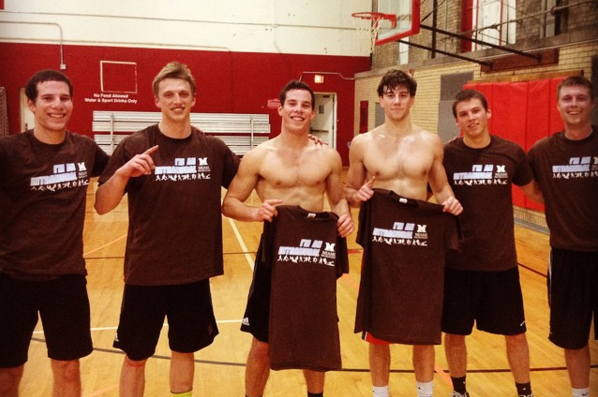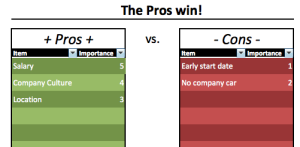
When the big interview is this week, an applicant will spend hours tweaking their resume back and forth.
Sometimes they make changes and decide they liked the old version better, or they will get stuck choosing between something silly like five different fonts.
Then they spend hours on social media deleting their bad pictures and updating their LinkedIn profile, just in case the employer checks.
These things above aren’t necessarily a waste of time, because they do deserve a time and place. But I believe they’re so trivial compared to the most important part in the job process.
And since applicants spend hours on the trivial stuff, they don’t prioritize their time to what matters above all else. So they overlook the main element that wins job offers and starts successful careers. And what is it, you ask?
The most important element to getting hired is knowing the difference between a bad interview answer (buzzwords) and a good interview answer (concrete examples), and then preparing and executing good interview answers.
Those who have an arsenal of concrete stories land offer after offer. Those who give bad interview answers with buzzwords are left feeling like something is wrong with them because they find no success. But nothing is wrong with them, what’s wrong is their interview strategy.
Bad Interview Answers
Besides spitting on the interviewer, basically the next worst thing (ok there’s a lot worse) you can do for your job prospects is to throw around buzzwords when answering interview questions. Buzzwords are a waste on your resume, but they stick out even worse and like a sore thumb in interviews.
Answering interviews in general jargon will drive a hiring manager crazy, because their job is to get to know your personality and assess if you would contribute value to their organization.
So using buzzwords in the interview like, “I’m very organized person, and self-motivated to be the best team player I can,” and leaving it there doesn’t give the manager a clue about you and your potential value. And buzzwords make you sound like you’re shading the truth, whether you are or aren’t it still looks bad.
So applicants who go on about general things they think sounds good have already lost the hiring manager’s attention and this job.
Because any recruiter or hiring manager with any experience knows what good interview answers sound like, and buzzwords aren’t it. Buzzwords are included in the list of words successful people don’t say.
And the bad part is I bet most applicants give vague answers and buzzwords in interviews. That’s not bad for you though, because once you read on and know what a good interview answer looks like there won’t be much competition in your way.
Good Interview Answers
Good interview answers aren’t that complicated. They start with a specific claim, and then back it up with a concrete example from the applicant’s experience. This example includes the context, the action you took in the situation, and the positive result.
This concrete example is so important because it shows the employer that you can also succeed and create value for their organization. Once the employer hears enough concrete examples, they will want to hire you before the interview is over.
What’s beautiful about this is since there is no such thing as a pop interview like there is a pop quiz, you can spend as much time as you need to prepare concrete stories.
Of course you have other responsibilities. But, what better activity to do for your future than to set a specific time to think of concrete examples off of your resume that show you in a positive light.
Cut out the marginal tweaks on your LinkedIn and resume, and come up with five to eight concrete stories at your disposal for your interview. Then finish it off by practicing speaking these good interview answers out loud to yourself, to your friends, and to your parents on the phone.
You will execute beautifully when the interview comes around. And by interviewing the right way from the start, you get immediate results that speed up your job search so you don’t have to interview for six months.
(Read this article to see the most common interview mistakes that will prolong your job search.)
Example Of A Good Interview Answer
Here’s an example from my life where a concrete story made all the difference.
Being an English major applying for outside sales positions, I knew I had to overcome the stereotype of having my head in the clouds writing poetry.
And since I’m insanely competitive, which is helpful in sales, I figured getting this across in my interview would overcome the English major stereotype and my overall perception.
So one time an employer asked me, “Why do you believe that you would excel in this outside sales position?” I mentioned three different reasons, one being I’m insanely competitive, and stated that I have examples for each of the three reasons.
Then he narrowed on the competitive trait and asked me, “What makes you more competitive than the next applicant?”
Instead of spraying vague answers at this guy and hoping one of them stuck, I did this. To start it off, I said, “Well actually my housemate Jeff just told me last week that I’m the most competitive person he’s ever met. But I have a quick story that’s a perfect example of my competitiveness.”
Then I told him the story of how my two really good friends approached me to join our intramural basketball team. Since I was the captain (a minor detail but another positive trait for leadership), I had the final say on the roster.
But I honestly told my two friends that I would love to play with them and it’s nothing personal, but we really want to win the championship this year and believe our team is better off with a smaller roster.
I later massaged the relationships with those friends, and we went undefeated to win the intramural basketball championship.
In that example, I actually managed to support my answer with two stories—one quick hitter about what my friend labeled me and another longer one that included some humor. But, this second story didn’t take more than a minute because I came prepared.
The man interviewing me smiled, laughed, and added a joke to the end of my story, telling me he loved it. Then he offered me the job next week.
Lesson For Your Job Interviews
My story above shows that when you prepare and execute a good interview answer, the employer will receive it well and instantly let you know that you killed it.
When you have five to eight convincing, concrete stories then behavioral interviews will turn into a walk in the park. For example, if the interviewer asked me a different follow-up question, I had another great story prepared.
When you’re prepared, you can leave the job search stress for the unprepared candidates who simply talk in buzzwords.
And if you want specific strategies to craft your resume into the perfect story and more examples of good interview answers, go ahead and purchase my bestselling Amazon book The Golden Resume.
Related: Top 15 Questions To Ask At The End Of The Interview


